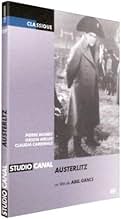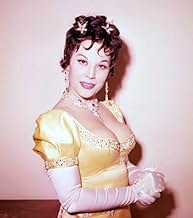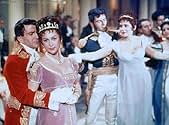VALUTAZIONE IMDb
6,2/10
1017
LA TUA VALUTAZIONE
Le avventure di Napoleone nella battaglia di Austerlitz, dove ottenne la più grande vittoria della sua carriera, sui russi.Le avventure di Napoleone nella battaglia di Austerlitz, dove ottenne la più grande vittoria della sua carriera, sui russi.Le avventure di Napoleone nella battaglia di Austerlitz, dove ottenne la più grande vittoria della sua carriera, sui russi.
- Premi
- 1 candidatura in totale
Trama
Lo sapevi?
- QuizIn the 1920s Abel Gance had written a six-part movie biography of Napoleon. He shot the first part (Napoleone (1927)), which turned out to be a financial disaster. He sold the sixth part to Lupu Pick, who shot Sant'Elena (1929). Wanting to make a comeback at the end of the 1950s, Gance rewrote the third part to make it "Austerlitz".
- BlooperIn the scene in William Pitt's office in London which is set in the early 1800's, you can see in the background through the window the Houses of Parliament and Big Ben, 60 years before they were built.
- Versioni alternativeThe original French version runs longer than the English dubbed international one. It contains extra scenes including ones with Napoleon visiting his mistress and of Ségur (Jean-Louis Trintignant) imagining the coronation of the emperor for the palace staff.
- ConnessioniEdited into Histoire(s) du cinéma: Seul le cinéma (1994)
Recensione in evidenza
I will begin by saying that I enjoyed enormously "Austerlitz"'s second part,that is,the military show as such.The political preamble is interesting by many things:Pierre Mondy's acting (though a miscast),the many good cameos (we have Mrs. Caron,Mrs. Cardinale,Mrs. Popesco, Palance, Marais,Simon,Trintignant,Welles,Pavloff,Jean Mercure in the same show,and at their best),many well-thought scenes,the cinematographic thinking of Gance,the script's sobriety in the treatment of the Bonaparte family (arrogance,vanity,etc.). I cannot but admire the choice of the bit parts.Many vignettes are ANTHOLOGICAL (e.g.,the Pope calling Bonaparte a comedian).No cheap jokes.
The script is unconventional,dense and considerate. Napoleon appears as a peevish, tetchy, burlesque, selfish,petulant, aggressive and endowed man (this portrait is very fair and balanced,and,if ironical and humorist, it is not at all disrespectful, heinous, outrageous--it is not a cartoon);his family:a bevy of greedy pushers,arrogant, vain parvenus, coarse intriguers, cads. The pettiness and the misery do not lack in Bonaparte's life.His sweetheart is a dowdy.
I liked a lot the costumes,the clothes,the uniforms.
Gance makes parade before our pleased eyes a series of expressive figurines,exquisitely molded (Carnot, Talleyrand,Kutuzov, Fulton,Mlle De Vaudey,Madame Récamier,Weirother,Lannes,Pius VII,etc.,etc.).
The women in this movie (Mrs. Caron,Mrs. Cardinale,Mrs. Elvire Popesco) are radiant and brilliant.
The more I think about "Austerlitz",the more I perceive its greatness and value."Austerlitz" must be tasted,but also thought about,analyzed. It satisfies both the heart and mind.
For me,"Austerlitz" is one of the most amazing,though imperfect, masterpieces.
This movie has its flaws;it also has obvious qualities and is worth watching .Practically,all the cameos are exceptional,a real feast:first of all,Marais and Simon,and also Wells,a very young Trintignant,Palance (it is quite debatable if Palance's histrionic performance is really that kitsch and tasteless;I think he was just playing Russian,though his role is that of an Austrian,and he succeeded in creating some funny moments in the movie;I enjoy what Palance did with his role:it's buffoonish,but also fun),etc..Marais is a standout,simply astonishing. The same is true about Jean Mercure (as "Talleyrand") and Polycarpe Pavloff (as "Kutuzov").
Pierre Mondy is an obviously skilled actor,but a miscast as Bonaparte.His ingrate physique does not help him this way.In the first part,that of the political rise of Napoleon,Pierre Mondy looks choleric,roguish,voluntary,brutal,mocking,irascible,clownish enough;but he can't look inspired,exceptional,larger-than-life.Maybe this is not Bonaparte,but is a well-made role.Undoubtedly,Pierre Mondy knows his job;but his performing is,sometimes,theatrical,and rather inadequate for cinema.A pleasant surprise is "Austerlitz"'s realism and irony,its lack of idolatry and of inhibitions:we see the Bonaparte family as it was,a bevy of parvenus and cads.
Gance does not incense Bonaparte's holy cards,does not extol him measureless.On the contrary,the script shows a powerful,able,sharp and temperate mind.
In "Austerlitz"'s first part,that might be entitled "Napoleon's rising" ,some actors play stiffly ,are theatrical and formal,obsolete and worn out,the movie recalls the scene.But the cameos (Marais,Simon, Trintignant,Pavloff) bring in a vast amount of exciting and largehearted acting.
I guess the first part of "Austerlitz" was intended as a prologue,a preparation,a political and historical preface.
The society depicted was a theatrical and quite cold one;still,the THEATRALISM of some of the performances displeases.Even the theatrical characters must be performed lively.
Simon's performance (as "Auboise") simply sweeps away anyone else on the set;his comic role is a great landmark in the history of cinema.
I am a huge fan of this second part of "Austerlitz";its photography is excellent:a gorgeous looking film .I also enjoyed a lot the cameos from Marais,Simon,De Sica (flawless!!!),Mrs. Elvire Popesco,Wells,Marchal (though not very remarkable here).
This fresco must be rehabilitated urgently.
Any national cinematography would take pride in a movie like "Austerlitz". But I guess many don't get this film's greatness, nor Gance's showmanship and taste.
Finally,I will add that Bloy held Bonaparte in high esteem;so did Hegel,Balzac, Stendhal,and even,in his youth,Schopenhauer.
The script is unconventional,dense and considerate. Napoleon appears as a peevish, tetchy, burlesque, selfish,petulant, aggressive and endowed man (this portrait is very fair and balanced,and,if ironical and humorist, it is not at all disrespectful, heinous, outrageous--it is not a cartoon);his family:a bevy of greedy pushers,arrogant, vain parvenus, coarse intriguers, cads. The pettiness and the misery do not lack in Bonaparte's life.His sweetheart is a dowdy.
I liked a lot the costumes,the clothes,the uniforms.
Gance makes parade before our pleased eyes a series of expressive figurines,exquisitely molded (Carnot, Talleyrand,Kutuzov, Fulton,Mlle De Vaudey,Madame Récamier,Weirother,Lannes,Pius VII,etc.,etc.).
The women in this movie (Mrs. Caron,Mrs. Cardinale,Mrs. Elvire Popesco) are radiant and brilliant.
The more I think about "Austerlitz",the more I perceive its greatness and value."Austerlitz" must be tasted,but also thought about,analyzed. It satisfies both the heart and mind.
For me,"Austerlitz" is one of the most amazing,though imperfect, masterpieces.
This movie has its flaws;it also has obvious qualities and is worth watching .Practically,all the cameos are exceptional,a real feast:first of all,Marais and Simon,and also Wells,a very young Trintignant,Palance (it is quite debatable if Palance's histrionic performance is really that kitsch and tasteless;I think he was just playing Russian,though his role is that of an Austrian,and he succeeded in creating some funny moments in the movie;I enjoy what Palance did with his role:it's buffoonish,but also fun),etc..Marais is a standout,simply astonishing. The same is true about Jean Mercure (as "Talleyrand") and Polycarpe Pavloff (as "Kutuzov").
Pierre Mondy is an obviously skilled actor,but a miscast as Bonaparte.His ingrate physique does not help him this way.In the first part,that of the political rise of Napoleon,Pierre Mondy looks choleric,roguish,voluntary,brutal,mocking,irascible,clownish enough;but he can't look inspired,exceptional,larger-than-life.Maybe this is not Bonaparte,but is a well-made role.Undoubtedly,Pierre Mondy knows his job;but his performing is,sometimes,theatrical,and rather inadequate for cinema.A pleasant surprise is "Austerlitz"'s realism and irony,its lack of idolatry and of inhibitions:we see the Bonaparte family as it was,a bevy of parvenus and cads.
Gance does not incense Bonaparte's holy cards,does not extol him measureless.On the contrary,the script shows a powerful,able,sharp and temperate mind.
In "Austerlitz"'s first part,that might be entitled "Napoleon's rising" ,some actors play stiffly ,are theatrical and formal,obsolete and worn out,the movie recalls the scene.But the cameos (Marais,Simon, Trintignant,Pavloff) bring in a vast amount of exciting and largehearted acting.
I guess the first part of "Austerlitz" was intended as a prologue,a preparation,a political and historical preface.
The society depicted was a theatrical and quite cold one;still,the THEATRALISM of some of the performances displeases.Even the theatrical characters must be performed lively.
Simon's performance (as "Auboise") simply sweeps away anyone else on the set;his comic role is a great landmark in the history of cinema.
I am a huge fan of this second part of "Austerlitz";its photography is excellent:a gorgeous looking film .I also enjoyed a lot the cameos from Marais,Simon,De Sica (flawless!!!),Mrs. Elvire Popesco,Wells,Marchal (though not very remarkable here).
This fresco must be rehabilitated urgently.
Any national cinematography would take pride in a movie like "Austerlitz". But I guess many don't get this film's greatness, nor Gance's showmanship and taste.
Finally,I will add that Bloy held Bonaparte in high esteem;so did Hegel,Balzac, Stendhal,and even,in his youth,Schopenhauer.
- Cristi_Ciopron
- 13 ago 2006
- Permalink
I più visti
Accedi per valutare e creare un elenco di titoli salvati per ottenere consigli personalizzati
- How long is The Battle of Austerlitz?Powered by Alexa
Dettagli
- Data di uscita
- Paesi di origine
- Lingua
- Celebre anche come
- The Battle of Austerlitz
- Luoghi delle riprese
- Aziende produttrici
- Vedi altri crediti dell’azienda su IMDbPro
Botteghino
- Budget
- 4.000.000 USD (previsto)
- Tempo di esecuzione2 ore 46 minuti
- Mix di suoni
- Proporzioni
- 2.35 : 1
Contribuisci a questa pagina
Suggerisci una modifica o aggiungi i contenuti mancanti

Divario superiore
What is the English language plot outline for Napoleone ad Austerlitz (1960)?
Rispondi





































